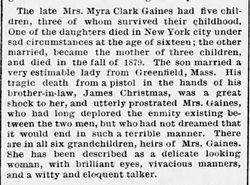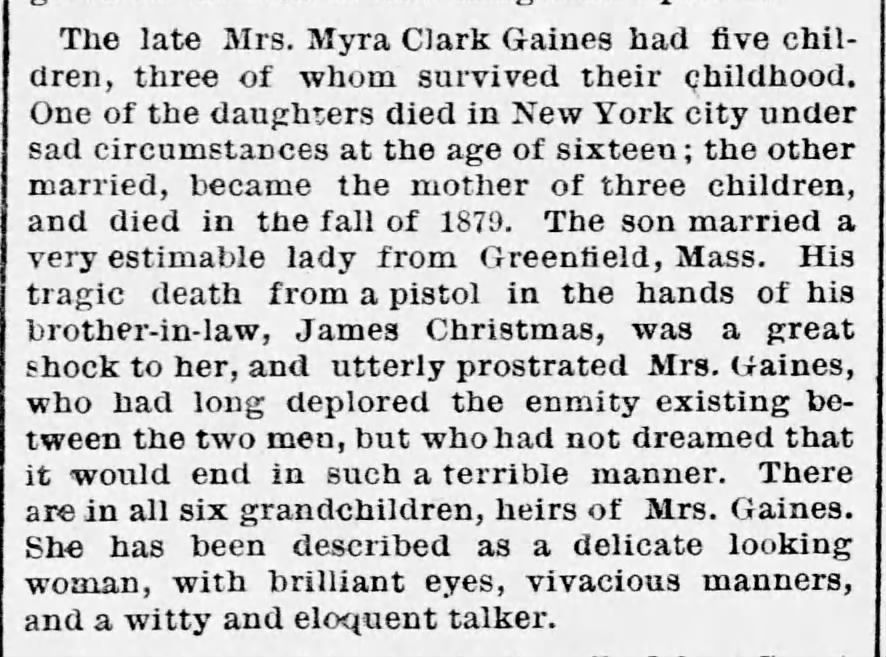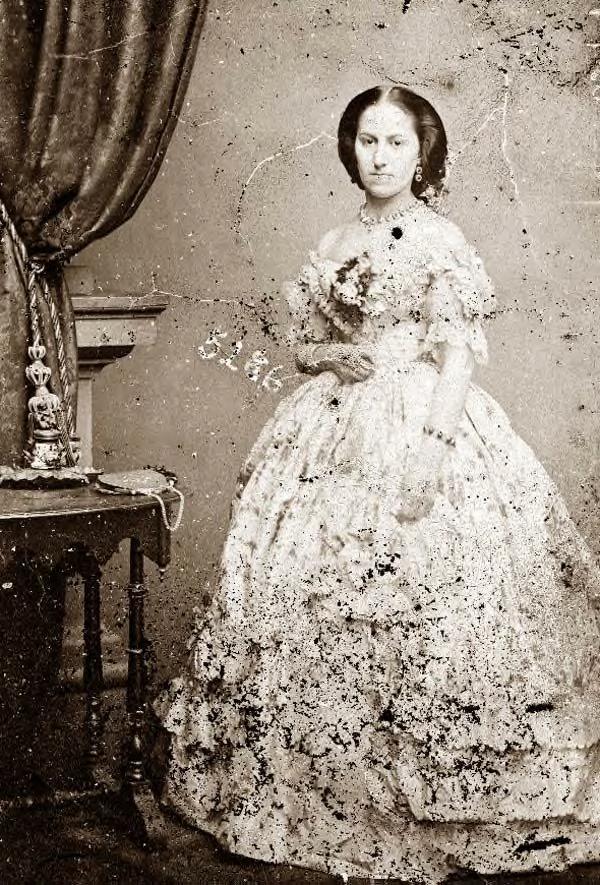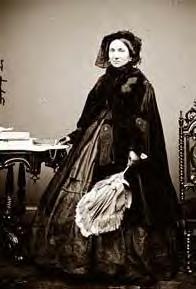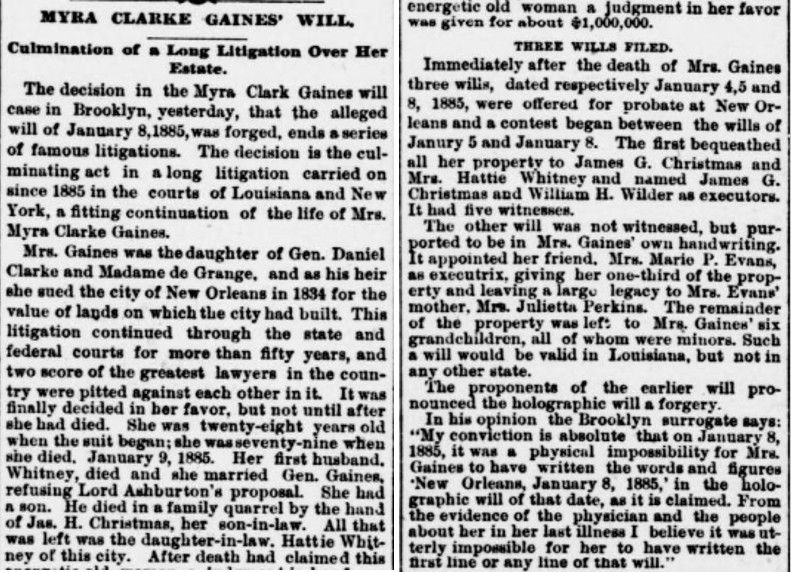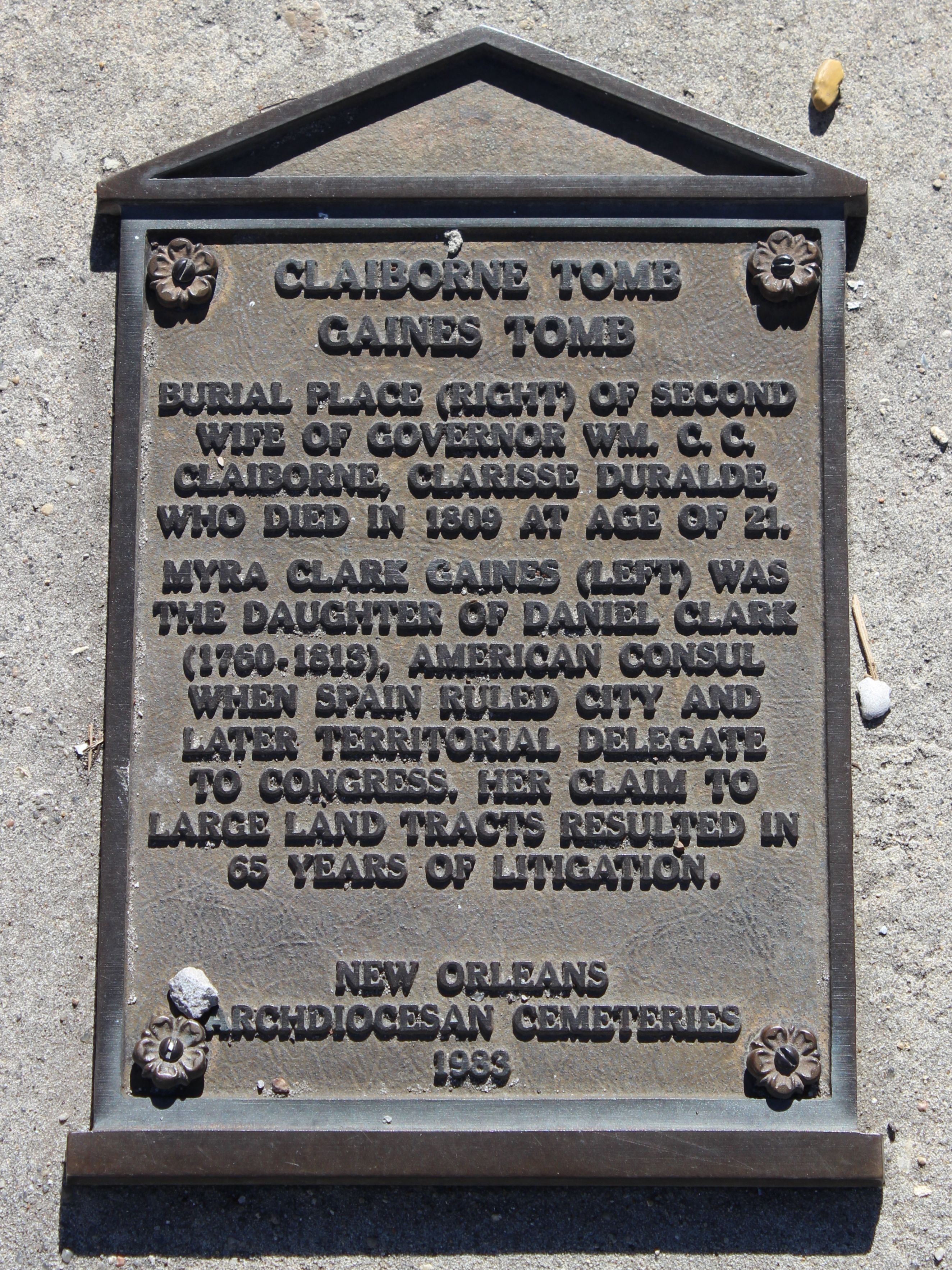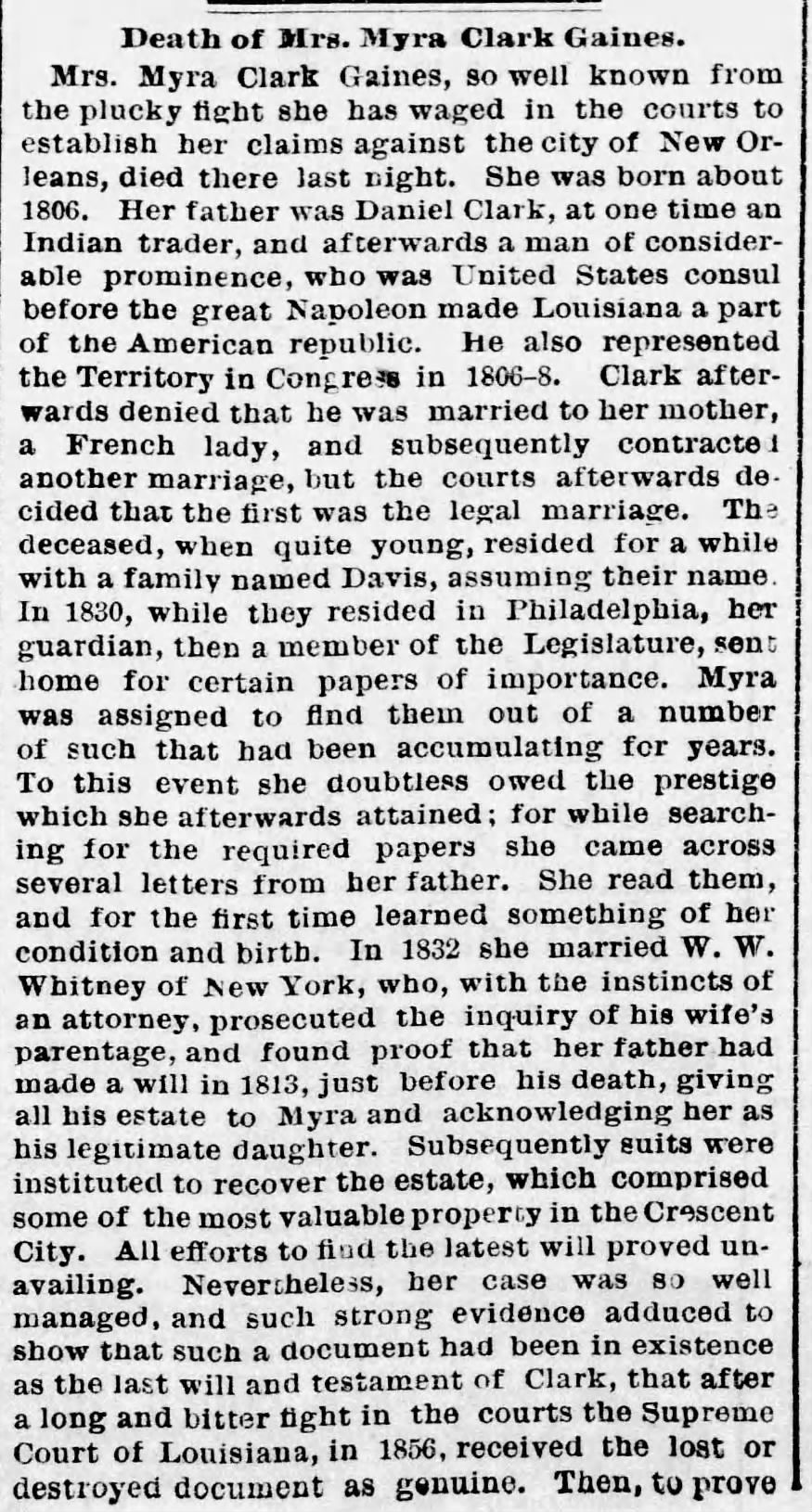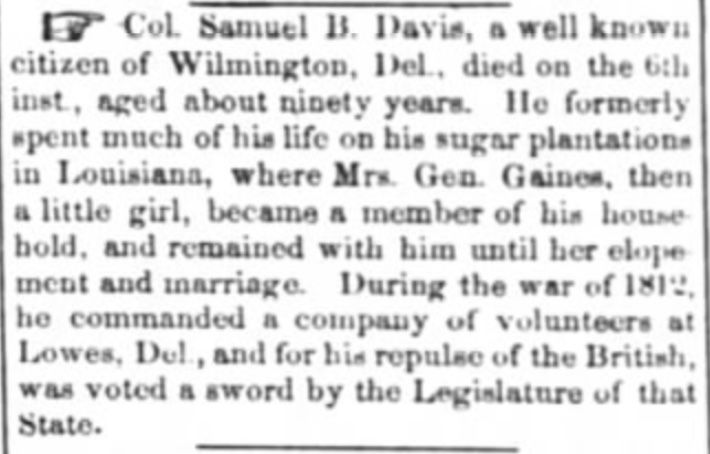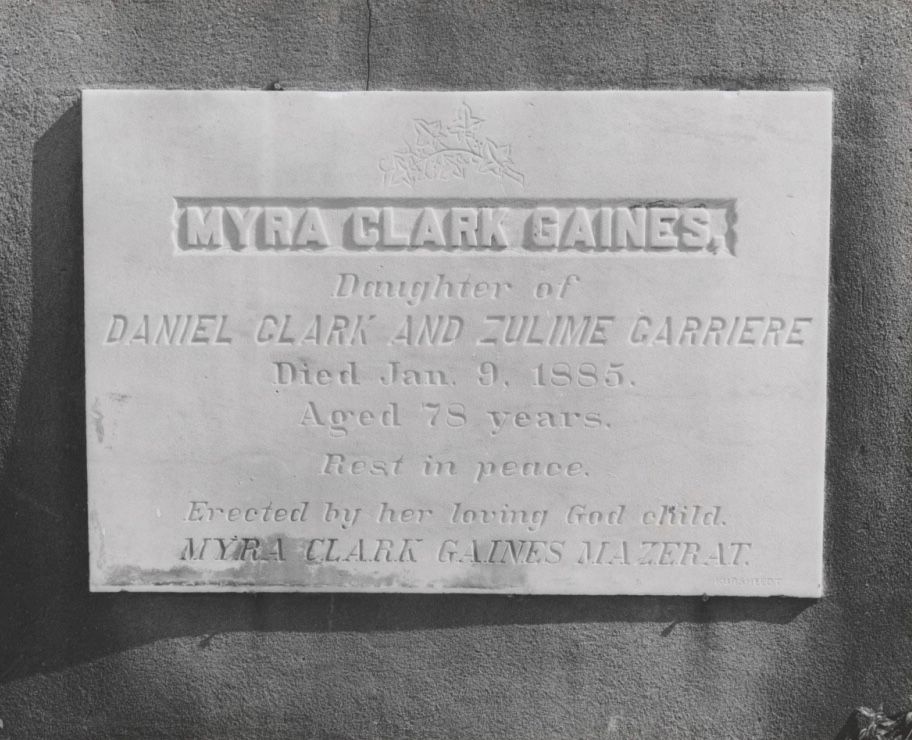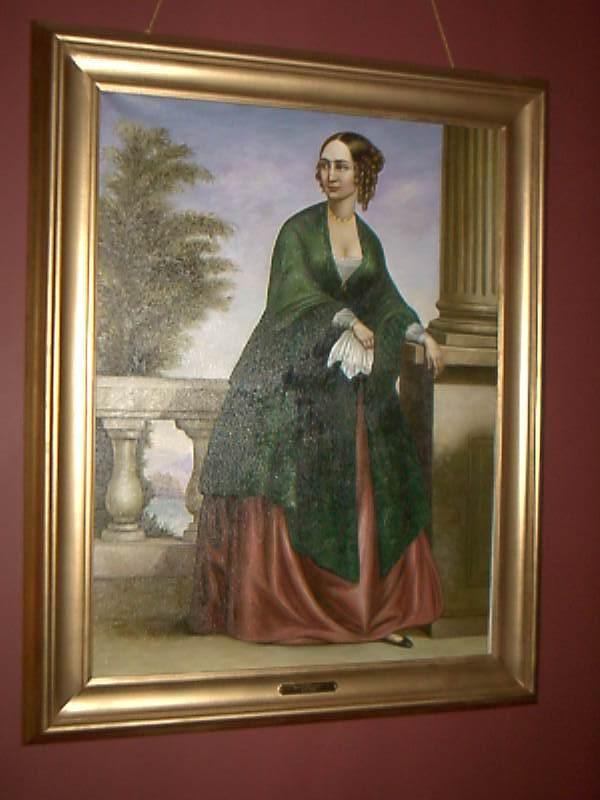Wednesday, January 14, 1885
Page 2, Column 2
Before a Higher Court.
The death of Mrs. Myra Clarke Gaines is announced in the New
Orleans papers of the 10th inst. She died on the 9th aged 79 years.
The court annals of this country does not present her parallel
as a litigant and she has received her share, along with other celebrities,
of public notice. Like Miss Flite, she lived in hopes of a judgment. Her
measure of success was greater, however, than that of the little woman in
Bleak House, but it was never realized to its fullest and it is not
improbable, judging by her litigious spirit, if we maybe allowed the
expression, that she has, like the ward in Jarndyce and Jarndyce, ³begun the
new world,² and is now pleading her cause before the high chancery of
heaven.
We append the following interesting though necessarily short
sketch of her life and the cause celebre in which she figured, from the
Picayune:
The career of Mrs. Gains was so eventful, so full of passages
upon which a biographer could dwell at length, so pregnant with suggestion
and incident, that it were vain to attempt, in a newspaper article, to do
more than sketch her life in outline, leaving to others the interesting
labor of giving body and mature form to the narrative.
The deceased was a prominent figure in the history of this city
for more than half a century, and the most noted of the litigants of this
country. The cause celebre of which she was the heroine, if one might use
the expression, was termed by the Federal Supreme Court ³the most remarkable
in the records of the courts,² and associates her name indissolubly with
forensic annals.
Mrs. Gaines was born in New Orleans in 1806. Her mother was Marie Zulime
Carriere, a woman of great beauty. She married a Frenchman named De Grange,
said to have been of noble ancestry, but who was reduced in circumstances
and was engaged in business as a confectioner at the corner of Royal and St.
Ann streets. It was charged at the time of this marriage De Grange had a
wife living, and the matter was submitted to ecclesiastical investigation.
No positive proof was brought forward of the accusation, and the
investigation terminated. Shortly afterwards De Grange left the city and
never returned.
About this time there was in New Orleans a man celebrated in
that day, Daniel Clark, a high-spirited, energetic, wealthy young Irishman,
who was taking an active part in public affairs. Employed in 1803 in the
negotiations attending the purchase of Louisiana, he was chosen as delegate
to Congress from the new Territory and served from 1806 to 1809. Daniel
Clark, fascinated by the charms of M¹me De Grange, married her,
notwithstanding the doubt existing as to the legality of the marriage were
De Grange still alive. The issue of this union was Myra Clark, who, from
her earliest recollection, lived in the family of Samuel B. Davis, and went
by the name of Myra Davis. In 1812 she accompanied the family to
Philadelphia and lived with them until 1832, when she married Wm. W.
Whitney. He died in 1838.
When Daniel Clark went to Washington as Territorial Delegate he became
infatuated with the beautiful Miss Canton of Baltimore, and contemplated
annulling his marriage with M¹me De Grange, on the ground of illegality, to
espouse the fair Baltimorean.
He returned to New Orleans, it is narrated, with this object in view, but
was involved in financial embarrassments and became very ill. During this
sickness he is supposed to have repented of his conduct toward Myra Clark,
and made a will acknowledging her as his legitimate daughter, bequeathing to
her his property. This occurred in 1816, and shortly afterward Daniel Clark
died.
M¹me De Grange married a Dr. Gardette and removed to Paris.
It was not until 1834 that Myra Clark, then Mrs. Whitney, obtained
information that she was the daughter of Daniel Clark and his universal
legatee under the will of 1813.
The first probated will of Daniel Clark was written in 1811, and make his
mother, Mary Clark, who lived in Philadelphia, legatee, with Richard Relf
and Beverly Chew of New Orleans as executors.
Mrs. Whitney took steps, as soon as practicable, to prove her identity and
establish her claims. Her husband died in 1838, and in 1845 she married
Major Gen. Edmund Pendleton Gaines, U.S.A., known as the ³hero of Fort
Erie.² She consented to become his wife only after he had pledged himself
to aid her in fighting the great legal battle which she had undertaken.
The litigation dragged on slowly, and it was not until 1856 that the will
claimed to have been made in 1813 was ordered probated. Gen. Gaines died in
1858, and his widow never remarried. Alone, and in the face of tremendous
odds, she prosecuted her cause with marvelous persistence and dauntless
courage. In 1868 the Supreme Court of the United States declared the
legitimacy of Myra Clark Gaines, and the validity of her claim as sole and
universal legatee of the estate of Daniel Clark.
It would require much time and space even to review in brief the course of
this interminal (sic) litigation. The proceedings since 1868, the great
suit against the city of New Orleans wherein Mrs. Gaines obtained a judgment
for a million of dollars or more, and the appeal of this case to the Supreme
Court, are facts sufficiently recent to be familiar. The suit is still
before that tribunal, and pending in the United States Senate is a bill
appropriating $38,000 in favor of Mrs. Gaines, in lieu of land belonging to
the Clark estate, and sold by the government.
Mrs. Gaines passed away without enjoying the fruits of her arduous labors.
In fact she died poor. Gen. Gaines left a son by a previous marriage who is
blind and for whom Mrs. Gaines provided out of her slender means. The issue
of her union with Mr. Whitney was a son, who is also deceased, leaving three
grandchildren, and a daughter, Mrs. Christmas, now dead, whose children
numbered three likewise. These six grandchildren are living, three being
residents of Washington, and three at school.
In her youth Mrs. Gaines was a lovely woman, gay, intelligent,
vivacious and good natured. These qualities she retained throughout her
troubled career, and no distress or reverse could silence the music of her
laughter. She was kind-hearted and of a religious temperament, frequently
asserting that when she became possessed of the wealth to which she laid
claim, it would be devoted to the relief of the poor and needy.
Her acquaintance with the laws relating to successions was amazing, and more
thorough than that of many lawyers. On several occasions she pleaded her
own cause with astonishing force and eloquence.
Wednesday, January 14, 1885
Page 2, Column 2
Before a Higher Court.
The death of Mrs. Myra Clarke Gaines is announced in the New
Orleans papers of the 10th inst. She died on the 9th aged 79 years.
The court annals of this country does not present her parallel
as a litigant and she has received her share, along with other celebrities,
of public notice. Like Miss Flite, she lived in hopes of a judgment. Her
measure of success was greater, however, than that of the little woman in
Bleak House, but it was never realized to its fullest and it is not
improbable, judging by her litigious spirit, if we maybe allowed the
expression, that she has, like the ward in Jarndyce and Jarndyce, ³begun the
new world,² and is now pleading her cause before the high chancery of
heaven.
We append the following interesting though necessarily short
sketch of her life and the cause celebre in which she figured, from the
Picayune:
The career of Mrs. Gains was so eventful, so full of passages
upon which a biographer could dwell at length, so pregnant with suggestion
and incident, that it were vain to attempt, in a newspaper article, to do
more than sketch her life in outline, leaving to others the interesting
labor of giving body and mature form to the narrative.
The deceased was a prominent figure in the history of this city
for more than half a century, and the most noted of the litigants of this
country. The cause celebre of which she was the heroine, if one might use
the expression, was termed by the Federal Supreme Court ³the most remarkable
in the records of the courts,² and associates her name indissolubly with
forensic annals.
Mrs. Gaines was born in New Orleans in 1806. Her mother was Marie Zulime
Carriere, a woman of great beauty. She married a Frenchman named De Grange,
said to have been of noble ancestry, but who was reduced in circumstances
and was engaged in business as a confectioner at the corner of Royal and St.
Ann streets. It was charged at the time of this marriage De Grange had a
wife living, and the matter was submitted to ecclesiastical investigation.
No positive proof was brought forward of the accusation, and the
investigation terminated. Shortly afterwards De Grange left the city and
never returned.
About this time there was in New Orleans a man celebrated in
that day, Daniel Clark, a high-spirited, energetic, wealthy young Irishman,
who was taking an active part in public affairs. Employed in 1803 in the
negotiations attending the purchase of Louisiana, he was chosen as delegate
to Congress from the new Territory and served from 1806 to 1809. Daniel
Clark, fascinated by the charms of M¹me De Grange, married her,
notwithstanding the doubt existing as to the legality of the marriage were
De Grange still alive. The issue of this union was Myra Clark, who, from
her earliest recollection, lived in the family of Samuel B. Davis, and went
by the name of Myra Davis. In 1812 she accompanied the family to
Philadelphia and lived with them until 1832, when she married Wm. W.
Whitney. He died in 1838.
When Daniel Clark went to Washington as Territorial Delegate he became
infatuated with the beautiful Miss Canton of Baltimore, and contemplated
annulling his marriage with M¹me De Grange, on the ground of illegality, to
espouse the fair Baltimorean.
He returned to New Orleans, it is narrated, with this object in view, but
was involved in financial embarrassments and became very ill. During this
sickness he is supposed to have repented of his conduct toward Myra Clark,
and made a will acknowledging her as his legitimate daughter, bequeathing to
her his property. This occurred in 1816, and shortly afterward Daniel Clark
died.
M¹me De Grange married a Dr. Gardette and removed to Paris.
It was not until 1834 that Myra Clark, then Mrs. Whitney, obtained
information that she was the daughter of Daniel Clark and his universal
legatee under the will of 1813.
The first probated will of Daniel Clark was written in 1811, and make his
mother, Mary Clark, who lived in Philadelphia, legatee, with Richard Relf
and Beverly Chew of New Orleans as executors.
Mrs. Whitney took steps, as soon as practicable, to prove her identity and
establish her claims. Her husband died in 1838, and in 1845 she married
Major Gen. Edmund Pendleton Gaines, U.S.A., known as the ³hero of Fort
Erie.² She consented to become his wife only after he had pledged himself
to aid her in fighting the great legal battle which she had undertaken.
The litigation dragged on slowly, and it was not until 1856 that the will
claimed to have been made in 1813 was ordered probated. Gen. Gaines died in
1858, and his widow never remarried. Alone, and in the face of tremendous
odds, she prosecuted her cause with marvelous persistence and dauntless
courage. In 1868 the Supreme Court of the United States declared the
legitimacy of Myra Clark Gaines, and the validity of her claim as sole and
universal legatee of the estate of Daniel Clark.
It would require much time and space even to review in brief the course of
this interminal (sic) litigation. The proceedings since 1868, the great
suit against the city of New Orleans wherein Mrs. Gaines obtained a judgment
for a million of dollars or more, and the appeal of this case to the Supreme
Court, are facts sufficiently recent to be familiar. The suit is still
before that tribunal, and pending in the United States Senate is a bill
appropriating $38,000 in favor of Mrs. Gaines, in lieu of land belonging to
the Clark estate, and sold by the government.
Mrs. Gaines passed away without enjoying the fruits of her arduous labors.
In fact she died poor. Gen. Gaines left a son by a previous marriage who is
blind and for whom Mrs. Gaines provided out of her slender means. The issue
of her union with Mr. Whitney was a son, who is also deceased, leaving three
grandchildren, and a daughter, Mrs. Christmas, now dead, whose children
numbered three likewise. These six grandchildren are living, three being
residents of Washington, and three at school.
In her youth Mrs. Gaines was a lovely woman, gay, intelligent,
vivacious and good natured. These qualities she retained throughout her
troubled career, and no distress or reverse could silence the music of her
laughter. She was kind-hearted and of a religious temperament, frequently
asserting that when she became possessed of the wealth to which she laid
claim, it would be devoted to the relief of the poor and needy.
Her acquaintance with the laws relating to successions was amazing, and more
thorough than that of many lawyers. On several occasions she pleaded her
own cause with astonishing force and eloquence.
Inscription
Myra Clark Gaines
Daughter of
Daniel Clark and Zuline Carrière,
Died January 9th, 1885,
Aged 78 Years.
Rest in Peace.
Erected by Her Loving Godchild,
Myra Clark Gaines Mazerat.
Family Members
Advertisement
Advertisement
